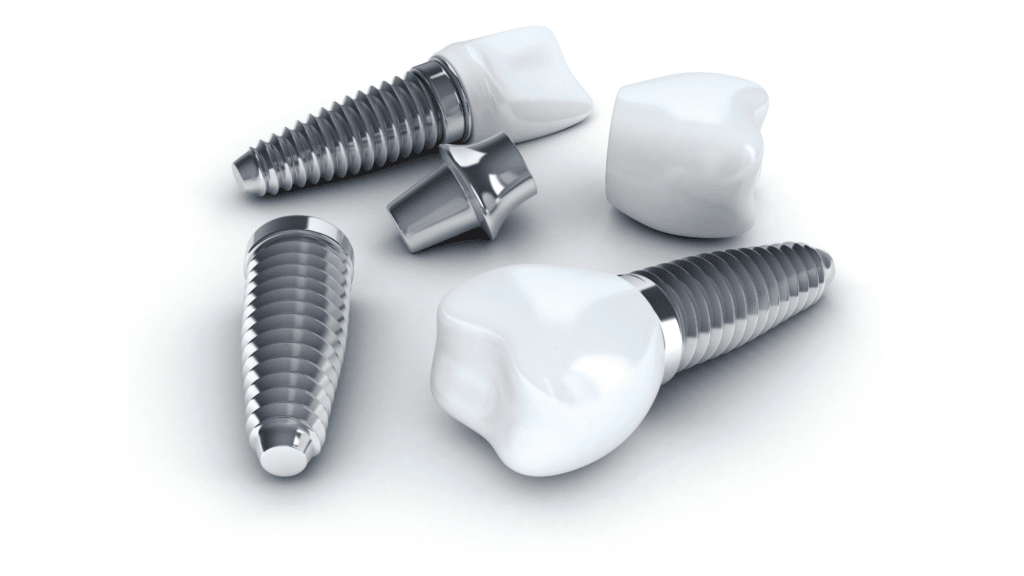
Dental implants are an excellent option for replacing missing teeth. Not only do they look and feel like natural teeth, but they can also last for many years with proper care. However, not everyone is suitable for this type of procedure. When considering dental implant placement, knowing if you are a viable candidate is essential to help you make an informed decision about your oral health.
What Are Dental Implants?
Dental implants are artificial tooth roots that are surgically placed into the jawbone. They provide a strong foundation for fixed or removable replacement teeth, such as dental crowns, bridges, and dentures. Implants are made of titanium, a biocompatible material that fuses with the bone over time. This fusion process creates a secure bond between the implant and the jawbone, allowing for a strong and stable foundation for the replacement teeth.
How Do Dental Implants Work?
Dental implants work by replacing the root of a missing tooth. A titanium post is surgically placed into the jawbone and allowed to heal and fuse with the bone over time. Once the implant has fused with the bone, it provides a sturdy foundation for replacement teeth, such as crowns, bridges, or dentures. The replacement teeth are then attached to the implant using abutments. This creates a secure and natural-looking restoration that looks and functions like a real tooth.
Am I a Candidate for Dental Implants?
The first step in determining if you are a viable candidate for dental implants is to have a consultation with your oral surgeon or dentist. During this appointment, your dentist will evaluate your gum tissues to ensure they are healthy and free of infection. They will check for signs of gum disease, such as redness, swelling, and bleeding. If there is any evidence of gum disease, it must be treated before the implants can be placed.
Your dentist will also take X-rays to determine if you have a strong, healthy jawbone for the procedure. If there is not enough bone, a bone graft may be necessary before the implants can be placed. A bone grafting procedure involves taking bone from another part of your body and grafting it onto the jawbone. It helps stimulate bone growth and provides a strong foundation for the implants.
If you have poor oral hygiene, your dentist may recommend that you improve your dental hygiene habits before undergoing a dental implant procedure. This is because poor oral hygiene can lead to periodontal disease and infection, which lowers your chances of a successful implant procedure. It is important to practice good oral hygiene habits such as brushing twice a day, flossing daily, and visiting your dentist regularly.
Who is Not a Good Candidate for Dental Implants?
#1. People who have active gum disease and weakened jawbone
Gum disease and a weakened jawbone can both be a sign that you are not a good candidate for implants. If you have gum disease, it must be treated before the procedure can be performed. If you don’t have adequate bone density, a bone graft may be necessary to provide a strong foundation for the implant.
#2. People who have poor oral hygiene habits
Poor oral hygiene habits, such as not brushing or flossing regularly, can lead to gum disease and infection, potentially resulting in implant failure.
#3. People who are below the age of 18
People under 18 are not typically considered good candidates for dental implant surgery. This is because the jawbone is still developing and may not be strong enough to support the implant.
#4. People who are pregnant
Hormones released during pregnancy can cause the gums to become more sensitive and prone to infection. Additionally, the medications used during the procedure can harm a developing fetus.
#5. People who are current smokers and heavy drinkers
Cigarette smoking increases the risk of gum disease and infection, which can cause implant failure. Additionally, drinking alcohol can cause your mouth to become dry, which can lead to gum disease. It also increases your risk of bone loss, making it difficult for the implant to stay in place.
#6. People who are taking certain medications
Certain medications, such as steroids, blood thinners, and heartburn medications, can interfere with the body’s ability to heal properly since it suppresses the immune system. This can increase the risk of dental implant failure rate.
#7. People who have had radiation therapy to the head or neck
Radiation therapy can damage the jawbone, making it difficult for the implant to fuse with the bone. Additionally, radiation therapy can cause dry mouth, leading to an increased risk of gum disease and infection.
#8. People who severely grind their teeth
The force of grinding can cause the implant to become loose or even break. Additionally, grinding can cause the jawbone to weaken, making it difficult for the implant to fuse with the bone. If you suffer from severe teeth grinding, your dentist may recommend a night guard or other treatment options before considering dental implants.
#9. People with diabetes or autoimmune disorders
Uncontrolled diabetes can cause poor blood circulation, which can slow down the healing process and increase the risk of infection. Autoimmune disorders can also affect the body’s ability to heal properly, making it difficult for the implant to fuse with the jawbone. If you have any of these health conditions, it is important to discuss them with your dentist before undergoing the procedure.
Book Your Implant Consultation Today at Eberhardt Dentistry
Implants provide a permanent solution to missing teeth and can help restore your smile and confidence. At Eberhardt Dentistry, we specialize in implant dentistry and can help you determine if you are a viable candidate for dental implants. Our dental team will work with you to create a personalized treatment plan that meets your needs and goals. Contact us today to book your implant consultation!
Dr. Kyle Eberhardt enjoys helping patients achieve better overall health through enhanced dental care. He earned his Doctor of Dental Surgery degree in 2007 and has since pursued continuing education in the field of dentistry. He is committed to lifelong learning and has received a fellowship from the Midwest Implant Institute in Ohio. He has also pursued advanced training with CEREC doctors in Arizona and North Carolina.



